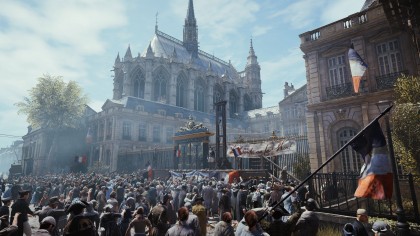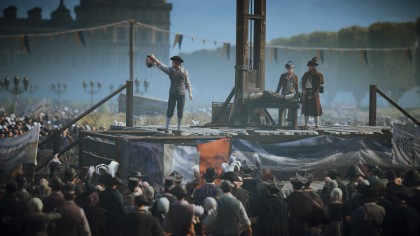Inside Assassin's Creed Unity, Ubisoft's 'leap of faith'
Arno takes the new-gen plunge
Mob mentality
Unity is the first Assassin's Creed to have its own 'crowd realisation team' whose job was to bring Paris to life with AI that feels organic. "It was a massive focus project. We can go up to 5000 AI in some missions, it goes up to 10,000 for the beheading of the King. That's for the massive crowd and for the individuality of every character, all those lives, all those professions, all the ways the people live. We have over 500 types of crowd life…"
This massive amount of crowd life is controlled by a new system of crowd reaction stimuli, used to make the AI feel natural and unscripted. So one character may be speaking to the crowd, with onlookers cheering or booing depending on the context of the speech.

"There are two very complex systems that are cooperating. The first one is what we call the bolt crowd. Bolt crowd is a very complex series of algorithms that simulates how people move when they're within a crowd of people. There's actually a pattern. Like when birds flock, people in crowds actually move in a systematic way. And then dipping in and out of the bolt crowd are individual complex AI. If they go away from you they become part of that bolt crowd, and when they step out, boom, full AI."
What's more, interacting with a big crowd will create a sort of domino effect of reactions. Setting off a firecracker will create a zone of real AI that will contaminate others around it. It's a pretty complex system.

"The systemic crowd was the first layer," says Guérin. "And then people, interaction between people. If two people cross in the street, there's a chance they might know each other, so they might shake hands. And then we started adding life to the environments and the interiors. The kitchens feel used, there are people working in there, there are tanneries, there are markets. Different elements will be stimuli that attract crowd.
"Then the next step over that is the three factions we have: the cops, the extremists, and the crowd itself, the allies. And when you start layering that stuff you start to have something that feels more like a living breathing environment than the sum of its parts."
Here comes the drop
Ubisoft has confirmed that Unity will run at 30 fps, 900p across both consoles. According to the team, it was a decision made to give the game a cinematic feel, but also because the AI was just too demanding on the CPU.
Get daily insight, inspiration and deals in your inbox
Sign up for breaking news, reviews, opinion, top tech deals, and more.
"At Ubisoft for a long time we wanted to push 60fps. I don't think it was a good idea because you don't gain that much from 60fps and it doesn't look like the real thing. It's a bit like The Hobbit movie. It looked really weird. And in other games it's the same, Rachet and Clank series, the drop there. So I think collectively in the video game industry we're dropping that standard because it's hard to achieve, it's twice as hard as 30fps, and it's not really that great in terms of rendering quality of the picture and the image."

Alex Amancio reiterates Guérin's thinking behind the decision: "30 was our goal, it feels more cinematic. 60 is really good for a shooter, action adventure not so much. It actually feels better for people when it's at that 30fps. It also lets us push the limits of everything to the maximum. It's like when people start asking about resolution. Is it the number of the quality of the pixels that you want? If the game looks gorgeous, who cares about the number?"
The Assassin's franchise has seen through an entire generation of consoles, though whether it will continue to have success for the next generation remains to be seen. "It's the first time that AC has had to make a leap of faith," says Amancio. "We wanted to create the same kind of awe you got when you played AC1. But it was also a huge headache because we didn't really know what was inside the machines. The other thing we knew was that we wanted to do a co-op game based on Paris during the French Revolution. That was everything we had [planned]. And as such we had to change almost everything, first for the co-op and then for the next gen."
From what we've seen and played so far, the team has comfortably achieved this, but whether those goals will align with player expectations is uncertain; this is almost a series reboot, but one that goes back to many of the basics of the franchise. What is certain is that with Unity, Assassin's Creed feels more at home than ever before.
Hugh Langley is the ex-News Editor of TechRadar. He had written for many magazines and websites including Business Insider, The Telegraph, IGN, Gizmodo, Entrepreneur Magazine, WIRED (UK), TrustedReviews, Business Insider Australia, Business Insider India, Business Insider Singapore, Wareable, The Ambient and more.
Hugh is now a correspondent at Business Insider covering Google and Alphabet, and has the unfortunate distinction of accidentally linking the TechRadar homepage to a rival publication.
